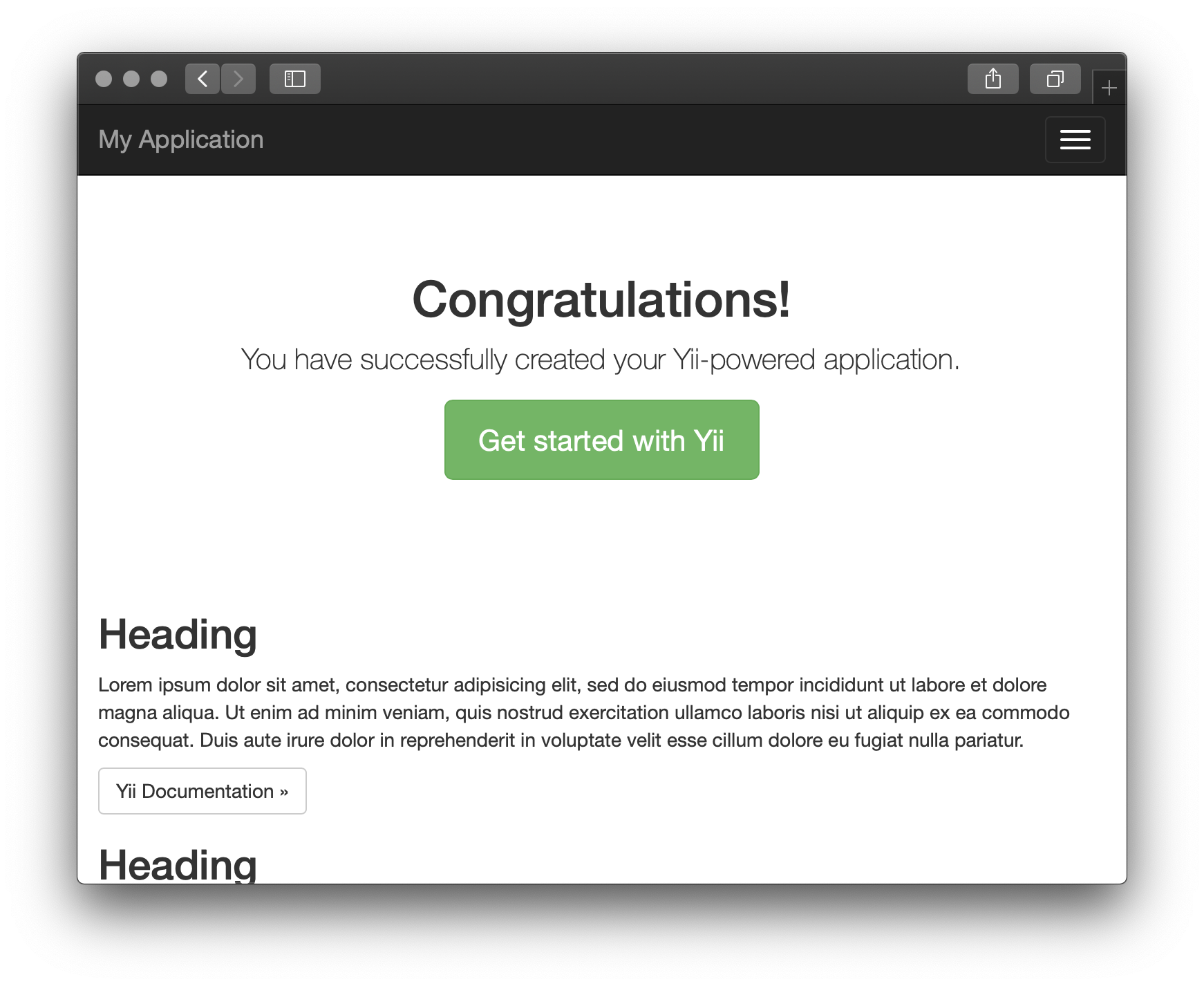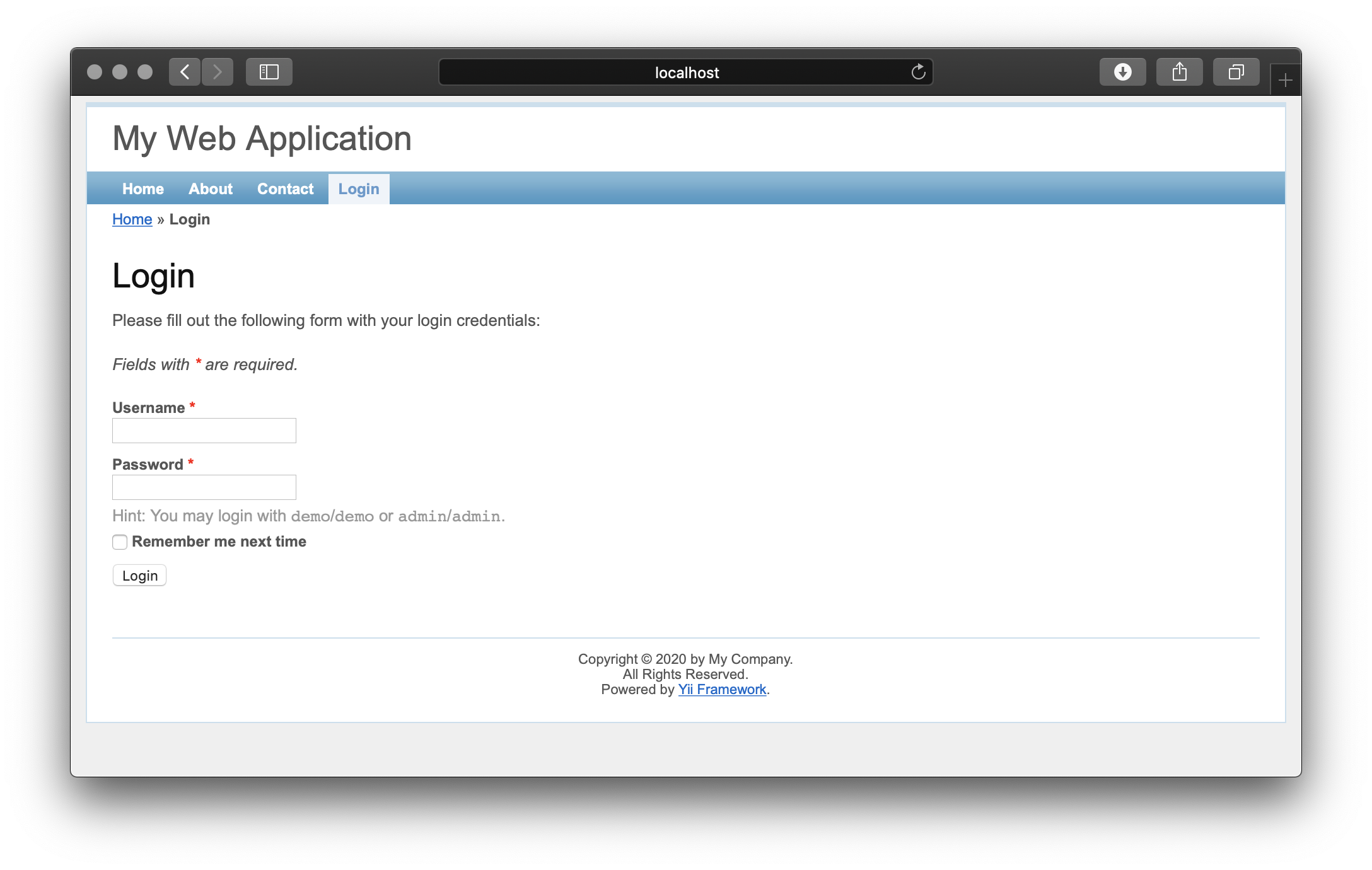Yii§
To run apps based on the Yii framework versions 1.1 or 2.0 using Unit:
Install Unit with a PHP language module.
Next, install Yii and create or deploy your app.
Here, we use Yii’s basic project template and Composer:
$ cd /path/to/ $ composer create-project --prefer-dist yiisoft/yii2-app-basic app
This creates the app’s directory tree at /path/to/app/. Its web/ subdirectory contains both the root index.php and the static files; if your app requires additional .php scripts, also store them here.
Run the following command so Unit can access the application directory:
# chown -R unit:unit /path/to/app/
Note
The unit:unit user-group pair is available only with official packages, Docker images, and some third-party repos. Otherwise, account names may differ; run the ps aux | grep unitd command to be sure.
For further details, including permissions, see the security checklist.
Next, prepare the Yii configuration for Unit (use real values for share and root):
{ "listeners": { "*:80": { "pass": "routes" } }, "routes": [ { "match": { "uri": [ "!/assets/*", "*.php", "*.php/*" ] }, "action": { "pass": "applications/yii/direct" } }, { "action": { "share": "/path/to/app/web$uri", "fallback": { "pass": "applications/yii/index" } } } ], "applications": { "yii": { "type": "php", "targets": { "direct": { "root": "/path/to/app/web/" }, "index": { "root": "/path/to/app/web/", "script": "index.php" } } } } }
For a detailed discussion, see Configuring Web Servers and Running Applications in Yii 2.0 docs.
Note
The difference between the pass targets is their usage of the script setting:
- The direct target runs the .php script from the URI or index.php if the URI omits it.
- The index target specifies the script that Unit runs for any URIs the target receives.
Upload the updated configuration. Assuming the JSON above was added to
config.json:# curl -X PUT --data-binary @config.json --unix-socket \ /path/to/control.unit.sock http://localhost/config/
Note
The control socket path may vary; run unitd -h or see Startup and Shutdown for details.
After a successful update, your app should be available on the listener’s IP address and port:

Install Unit with a PHP language module.
Next, install Yii and create or deploy your app.
Here, we use Yii’s basic project template and yiic:
$ git clone git@github.com:yiisoft/yii.git /path/to/yii1.1/ $ /path/to/yii1.1/framework/yiic webapp /path/to/app/
This creates the app’s directory tree at /path/to/app/.
Next, prepare the Yii configuration for Unit (use real values for share and root):
{ "listeners": { "*:80": { "pass": "routes" } }, "routes": [ { "match": { "uri": [ "!/assets/*", "!/protected/*", "!/themes/*", "*.php", "*.php/*" ] }, "action": { "pass": "applications/yii/direct" } }, { "action": { "share": "/path/to/app$uri", "fallback": { "pass": "applications/yii/index" } } } ], "applications": { "yii": { "type": "php", "targets": { "direct": { "root": "/path/to/app/" }, "index": { "root": "/path/to/app/", "script": "index.php" } } } } }
For a detailed discussion, see Yii 1.1 docs.
Note
The difference between the pass targets is their usage of the script setting:
- The direct target runs the .php script from the URI or index.php if the URI omits it.
- The index target specifies the script that Unit runs for any URIs the target receives.
Upload the updated configuration. Assuming the JSON above was added to
config.json:# curl -X PUT --data-binary @config.json --unix-socket \ /path/to/control.unit.sock http://localhost/config/
Note
The control socket path may vary; run unitd -h or see Startup and Shutdown for details.
After a successful update, your app should be available on the listener’s IP address and port:
